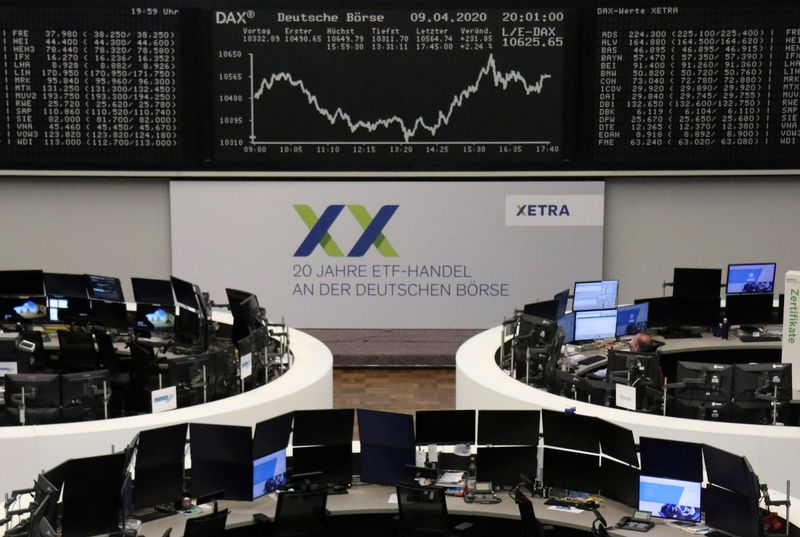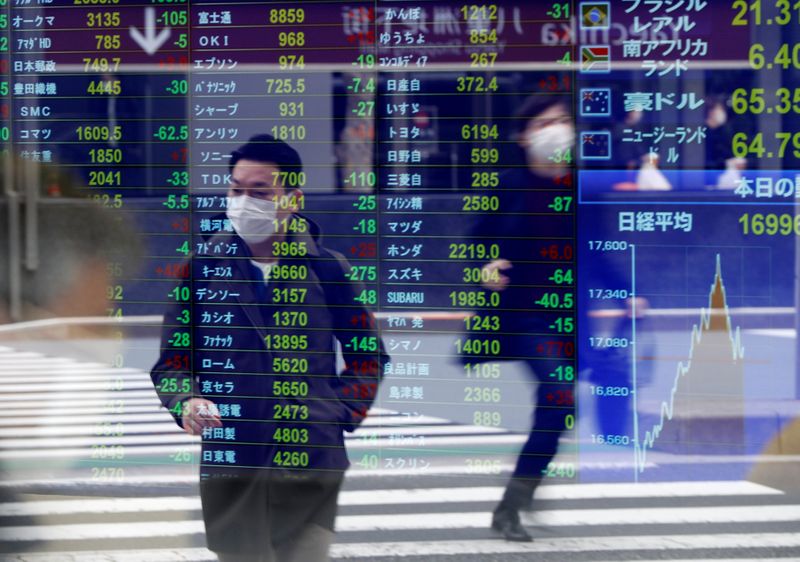By Ritvik Carvalho
LONDON (Reuters) - World stocks gained on Tuesday after Chinese trade data came in better than expected and some countries tried to restart their economy by partly lifting restrictions aimed at containing the coronavirus outbreak.
European stock markets opened stronger, with the pan-European STOXX 600 (STOXX) index rising 0.6% to its highest since March 11.
Analysts said the threat of a much deeper and prolonged downturn was starting to dissipate as new coronavirus cases declined in major economies and a raft of monetary and fiscal stimulus took effect globally.
Spanish shares (IBEX) gained 1.5% as some businesses re-opened, although shops, bars and public spaces were set to stay closed until at least April 26. (EU)
"Although further slowdown in the pandemic's spreading may keep sentiment supported, we are still reluctant to trust a long-lasting recovery, and we prefer to take things day by day," said Charalambos Pissouros, analyst at JFD Group.
Market sentiment was boosted by data showing China's exports fell only 6.6% in March from a year ago, less than the expected 14% plunge. Imports fell 0.9% compared with expectations for a 9.5% drop.
The gains in Europe took MSCI's All-Country World Index (MIWD00000PUS), which tracks shares across 49 countries, up 0.5%.
(GRAPHIC: World stocks vs. COVID-19 confirmed cases - https://fingfx.thomsonreuters.com/gfx/mkt/dgkplkmkvbx/Pasted%20image%201586848940390.png)
Chinese shares gained, with the blue-chip index (CSI300) up 1.2%. Australian shares (AXJO) were up 1.7% and Japan's Nikkei (N225) rose 2.8%. Hong Kong's Hang Seng (HSI) was up 0.9%.
MSCI's broadest index of Asia-Pacific shares excluding Japan (MIAPJ0000PUS) rose 1.3% to its highest in a month, up 20% from a four-year low on March 19.
Investors are now eyeing the easing of virus-related restrictions in some regions for further trading cues.
In Europe, thousands of shops across Austria are set to re-open on Tuesday. Spain recorded its smallest proportional daily rise in the number of deaths and new infections since early March and let some businesses return to work on Monday.
In the United States, which has recorded the highest number of casualties from the virus in the world, President Donald Trump said on Monday his administration was close to completing a plan to re-open the U.S. economy. However, some state governors say the decision to restart businesses lies with them.
Wall Street indexes ended mixed on Monday. The Dow and S&P 500 fell, but a 6.2% gain in Amazon (NASDAQ:AMZN) shares helped the Nasdaq end higher.
"The pullback in US equities should come as no surprise in light of last week's historic rally," said Mark Haefele, chief investment officer at UBS Wealth Management, noting the S&P 500 posting its best weekly performance since 1974.
"Sentiment will zigzag until there is more clarity on formal measures to reopen major economies. More broadly, even though global markets have rebounded, it is difficult to say with any certainty whether the bottom has been reached."
Oil prices rose around 1% after the U.S. Energy Information Administration (EIA) predicted shale output in the world's biggest crude producer would fall by a record amount in April, adding to cuts from other major producers.
U.S. crude (CLc1) was up 0.85% at $22.55 a barrel, compared with a January peak of $63.27. Brent (LCOc1) rose 1.3% to $32.16 a barrel.
Gold prices
In currencies, the dollar extended losses on the back of the U.S. Federal Reserve's massive new lending programme. It weakened against the Japanese yen
(This story refiles to remove extraneous word in headline; no change in text.)

